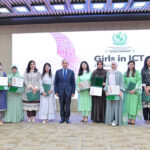BEIJING, Oct 2 (APP):The growing number of Pakistani youth studying at Donghua University, Shanghai will contribute to the construction of China Pakistan Economic Corridor (CPEC) and Belt and Road Initiative and in the future “it will also provide more professionals to Pakistan,” said Dean of International Cultural Exchange School at Donghua University, Prof. Yao Weixin.
On May 21 1951, China and Pakistan established diplomatic relations. Over the past 70 years, cultural and economic exchange helped both countries set a glorious course, side by side. It just so happens that this year, Donghua University also celebrates its 70th anniversary. And throughout the decades, DHU has welcomed many students from the “Iron Brother”.
DHU is a world-class and high-level research university, with focus on textiles, materials and costume designing. It has absorbed a large number of Pakistani students and trained them into professional talents.
“In 1975, we recruited the first batch of Pakistani students. In nearly half a century, the number of high-level Pakistani talents at Donghua University has increased rapidly, mainly science and engineering graduate students.
At present, we have a total of 74 Pakistani students, of which only three are undergraduates, and the others are master and doctoral students”, noted Prof. Yao Weixin, the Dean of International Cultural Exchange School at the Donghua University, in an exclusive interview with China Economic Net.
“Here I realized rapid personal growth. I have learned the professional knowledge of textile chemistry and became a start up founder from an ordinary student”, mentioned Faizan Shafiq, a doctoral student. “My teachers and classmates have helped me a lot, none of them showed impatience. The idea of starting up my own business was also supported firmly by my tutor. Moreover, he found a textile foundry for me. As a matter of fact, not only me, but all Pakistani students regard DHU as our second home.”
From 2011, Donghua University has taken a new step in its teaching plan for cultivating Pakistani students. DHU organized faculties of textiles, materials, chemistry, information and other disciplines to offer nine professional courses such as textile engineering taught in English, which have greatly met the learning needs of Pakistani students.
“We give them warm care in daily life, but in academic sector, they must abide by the same standards as Chinese students in examinations, thesis defenses, and paper publishing, urging them to study assiduously in order to truly become talents and contribute to China-Pakistan cooperation,” Prof. Yao said.
In addition, social practice is also the top priority for the training of Pakistani students at Donghua University. So far, through practical projects, Pakistani students have visited various types of textile companies in the Yangtze River Delta region. Many Chinese enterprises, including Shanghai Textile and Zhejiang Antai, have set up practice bases for them.
Over the years, Donghua University has made unremitting efforts for technical cooperation and talent training in the textile industry in the construction of the Belt and Road Initiative. In 2017, it was approved to be the host institution of the National Silk Road Scholarship. In September of the same year, DHU welcomed the first batch of 30 students who obtained the scholarship, 14 of whom were Pakistani students. Up to now, 62 Pakistani students have won this scholarship.
On December 8, 2018, a total of 33 textile-related universities from 19 countries formally established the World Textile University Alliance. The Alliance aims to strengthen higher education, textile industry and fashion design and technology-related exchanges and mutual learning among all countries and particularly along the Belt and Road. Donghua University has joined hands with the National Textile University of Pakistan to become a founding member of the WTUA, according to Prof. Yao.





